May 25, 2025 | 00:46 GMT +7
May 25, 2025 | 00:46 GMT +7
Hotline: 0913.378.918
May 25, 2025 | 00:46 GMT +7
Hotline: 0913.378.918
Mr. Trinh Hung Cong, the owner of Yuuki Farm - producing organic veggies according to Japanese technology, is rearing 10,000 chicks on the biological cushions to make fertilizer for his 10,000-meter square area of organic vegetables planting. According to Cong, chicken manure is beneficial to short-term plants, especially vegetables owing to its abundant protein.
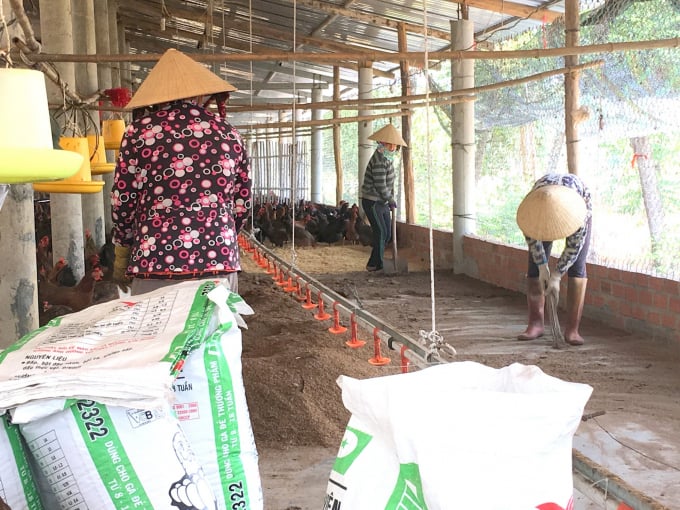
Manure from chicken farms in Binh Dinh area is collected periodically. Photo: Vu Dinh Thung.
“Chicken manure supplies nutrients for plants according to the ratio of 8-1-1 instead of 5-2-2 like that of cow manure. It means, after the very first month of fertilizing, chicken manure will supply 80 percent nutrients for plants, and 100 percent nutrients for the two following months. Within 3 months, the manure will dissolve fully, suited for 1 cycle of growth and development of vegetables,” Mr. Cong evaluated.
According to Cong, before chicks are flocked into the barn, rice husks to build cushions must be sterilized properly. After that, Mr. Cong spays a layer of fermented rice bran with molasses and soybeans onto the rice husk cushion one day before releasing the chicken into the barn. During the cycle of rearing a litter of chicks, Mr. Cong dusted rice bran over the husk six times.
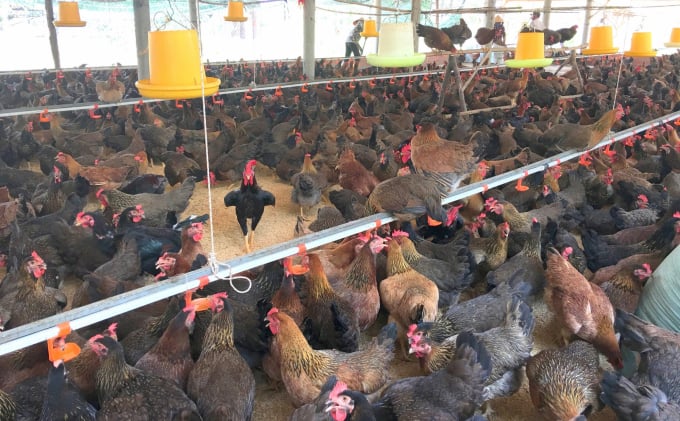
Currently, Binh Dinh has a very large amount of chicken manure. Photo: Le Khanh.
Another advantage of chicken manure to short-term plants, especially organic veggies is that the manure’s nutrients are delivered straight to the plants. The rate of absorption of chicken manure by plants is similar to that of chemical fertilizers, but the nutrition of chicken manure lasts throughout the full crop. While the growth and development cycle of plants is brief, about 1-3 months depending on the kind, chicken manure may assure nutrients for plants throughout the full season, most efficiently for organic crops.
Binh Dinh currently has a large amount of chicken manure due to its 6 million chicken flock, especially given the province's two large-scale breeding enterprises, Minh Du Poultry Breeding Company Limited (Minh Du Company Limited) in Phuoc Nghia commune (Tuy Phuoc district), and Cao Khanh Poultry Breeding Company Limited (Cao Khanh Company) in Cat Tan commune (Phu Cat district).
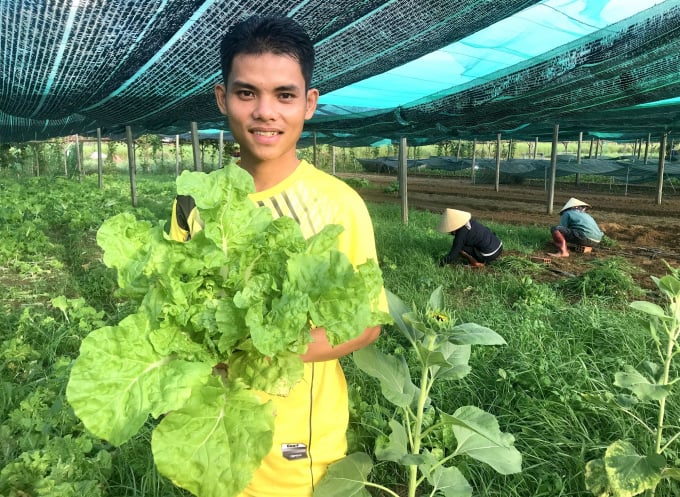
Organic vegetables are fertilized with highly nutritious chicken manure, so they grow very well. Photo: Vu Dinh Thung.
Mr. Cao Van Khanh, director of Cao Khanh firm, disclosed that the company has a combined flock of 300,000 parental chickens that are reared on biological cushions in 25 lines of barn. Each barn produces 5,000 bags of chicken manure (15 kg/bag), which equates to 75 tons in total. Thus, every three months, Cao Khanh Company gathers 1,875 tons of chicken manure mixed with rice husks from its 25 rows of barns.
Minh Du Company holds around 1.2 million parent chickens, which is four times the number owned by Cao Khanh Company. Thus, in accordance with Cao Khanh Company's method of collecting chicken manure, Minh Du Company will collect 7,500 tons of chicken manure on a biological cushion every three months.
According to livestock industry specialists, Minh Du Company's chicken manure is of exceptional quality. After analysis, it was shown that Minh Du Company's chicken manure had an extremely high nutritional value.
In particular, the chicken manure in the Minh Du Company's barn is dry, which means it does not emit a foul-smelling odor. Thanks to its ability to manage the moisture content of chicken manure, when a Japanese expert visited the parent chicken farm of Minh Du Company, he was able to easily pick up chicken droppings in the barn and smell it before praising the quality.
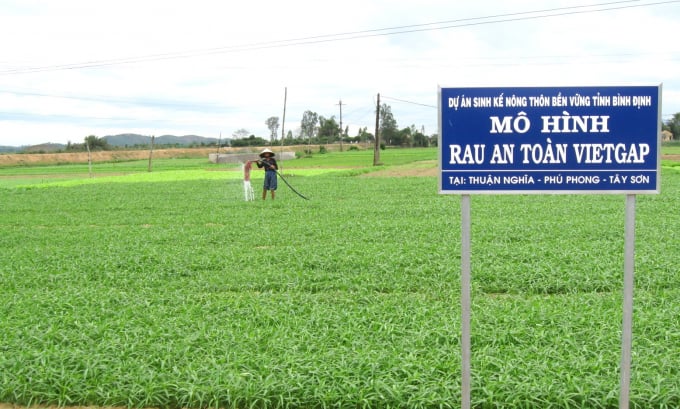
Binh Dinh currently has many safe vegetable production areas, so chicken manure is in great in need. Photo: Le Khanh.
Regrettably, Minh Du Company's chicken manure is now marketed in the same natural form as that of Cao Khanh Company, due to the absence of a processing plant in the region. Mr. Dao Van Hung, Deputy Director of the Binh Dinh Department of Agriculture and Rural Development, observed a chicken manure processing technology line that resembled an animal feed processing line during a visit to Dong Nai.
"With such a large quantity of chicken manure from two enterprises specializing in domestic chicken breeds Minh Du and Cao Khanh, as well as a number of commercial chicken farms, we are attracting investors to Binh Dinh to build a manure processing plant. organic chicken manure to provide safe vegetable production areas in the area," Mr. Dao Van Hung explained.
According to Mr. Huynh Ngoc Diep, Deputy Director of the Binh Dinh Livestock Production and Animal Health Sub-Department, the province currently has a total herd of approximately 300,000 buffaloes and cows; on average, each buffalo and cow produces ten kilograms of waste per day, totaling 3,000 tons per day.
The pig herd in Binh Dinh presently numbers 7,000 heads (excluding piglets). On average, one pig generates 2.5 kg of waste per day, with a total herd of 700,000 pigs producing 225 tons of trash each year.
Poultry flocks in Binh Dinh number over 8 million heads (including 6 million hens), and each head produces 0.2kg of trash per day, equating to 1,600 tons of wastes per day for the whole poultry flock. Each year, 584,000 tons of manure are generated.
The volume of animal manure generated is enormous, but because Binh Dinh lacks a processing plant, it is primarily treated manually.
Translated by Linh Linh
![Advanced mariculture – an inevitable trend: [1] Moving offshore](https://t.ex-cdn.com/nongnghiepmoitruong.vn/608w/files/phucpm/2025/05/18/0252-2436-nuoi-bien-6-162148_783.jpg)
(VAN) Mariculture using advanced technology and moving offshore is an inevitable trend, as nearshore areas increasingly reveal limitations.

(VAN) South Korea is currently the second-largest investor in Hai Phong in terms of the number of projects (186 projects) and the largest in terms of total registered investment capital, reaching USD 14.2 billion.
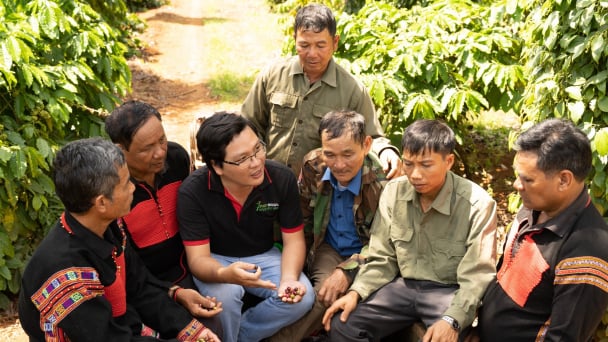
(VAN) As consumers become more environmentally conscious, legal regulations grow increasingly stringent...
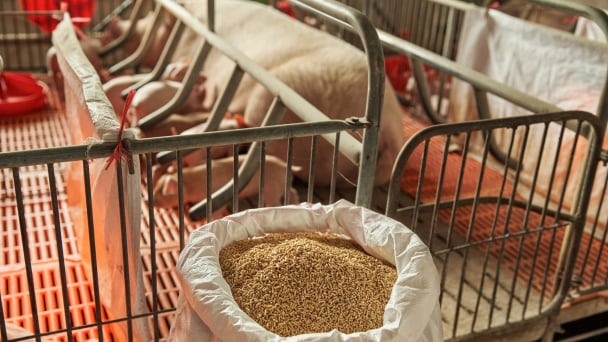
(VAN) CJ Feed&Care officially launched the FCR improvement campaign called “2025 Find Challenge Reach” in April 2025. In Vietnam, this campaign is implemented by CJ Vina Agri.
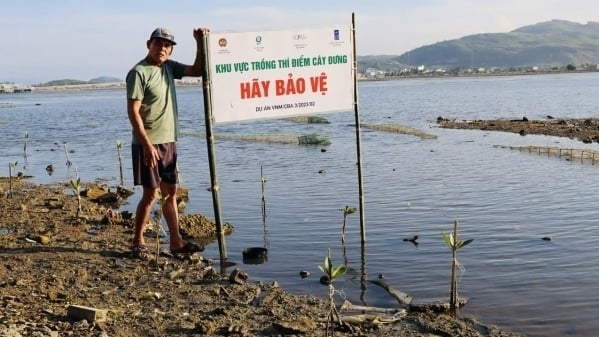
(VAN) The swamp in Pho Thanh is gradually being covered with red mangrove, creating a favorable environment for producing clean, high-quality salt.

(VAN) The trade turnover of agro-forestry-fishery products is growing significantly, along with investment cooperation commitments that are opening up new development directions between Vietnam and Russia.

(VAN) Khanh Hoa is investing over 545 billion VND to develop 240 hectares of high-tech marine aquaculture in order to guarantee a consistent supply of seafood exports and achieve the USD 1 billion target.